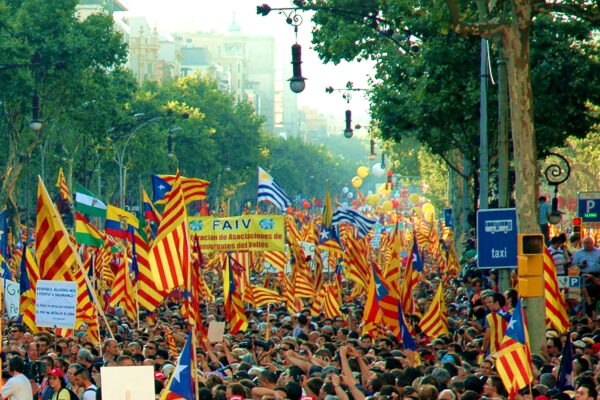
Ramón Pérez-Maura has a blistering op-ed in Politico, where he takes the Catalan independence movement to task for “campaigning on the backs of the dead” of the recent terrorist attacks.
This is ludicrous.
Paranoid
Pérez-Maura criticizes the Catalan regional government for communicating about the attacks in Catalan. Why not in Castilian Spanish?
The government wanted to take advantage of the situation and send a message to the world: “We are a different country.”
Nonsense. Public announcements are always made in Catalan first, Spanish second. You can argue the order should have been reversed in this case, but to infer some nefarious meaning from what is standard procedure is paranoid.
Extremists
Pérez-Maura devotes much of the rest of his column to separatist extremists who refused to join an anti-terror march if the Spanish king and prime minister also attended.
He makes a lot out of the fact that some brought Catalan flags to the demonstration but doesn’t mention there were as many Spanish flags.
Nor does he find space to mention that 500,000 Catalans (out of a population of 7.5 million) showed up — whatever their views on independence.
Zeroing in on the most extreme elements in the independence movement and then holding the entire region responsible is like Donald Trump equating white supremacists marching in Charlottesville, Virginia earlier this month with those who came out to protest against them because there were a few antifascist troublemakers among the latter. It’s a distraction.
Unhelpful
Contemptuous rhetoric like Pérez-Maura’s is unhelpful. It reveals a lack of curiosity about the motivations of those who want to break away from Spain (the same author once claimed the only reason Catalans want their own state is that they “have to be above the rest”) — and that is part of the problem.
The Catalans aren’t desperate for independence. Many have friends and family elsewhere in Spain. More people in Barcelona speak Spanish than Catalan. The economics argue against it. Catalan companies do business across the country. Independence would mean giving up and reapplying for EU membership. Little wonder the majority would rather remain in Spain.
But support for independence has gone up and the reason is the intransigent attitude taken by many in Madrid.
Try a little empathy
Catalonia’s autonomy statute was struck down by the Constitutional Court in 2010. Its first attempt at an independence referendum, in 2014, was declared illegal. The national government has refused to hear Catalan arguments for another one. National newspapers, like Pérez-Maura’s, report on every one of the Catalan government’s failures (which are real) but seldom run stories that explore how and why separatist parties managed to take control of it.
Needless to say, accusing Catalan nationalists of attempting to “profit” from a terrorist attack is not going to change minds.
A little empathy, by contrast, and maybe a little bit of compromise, would go a long way.
